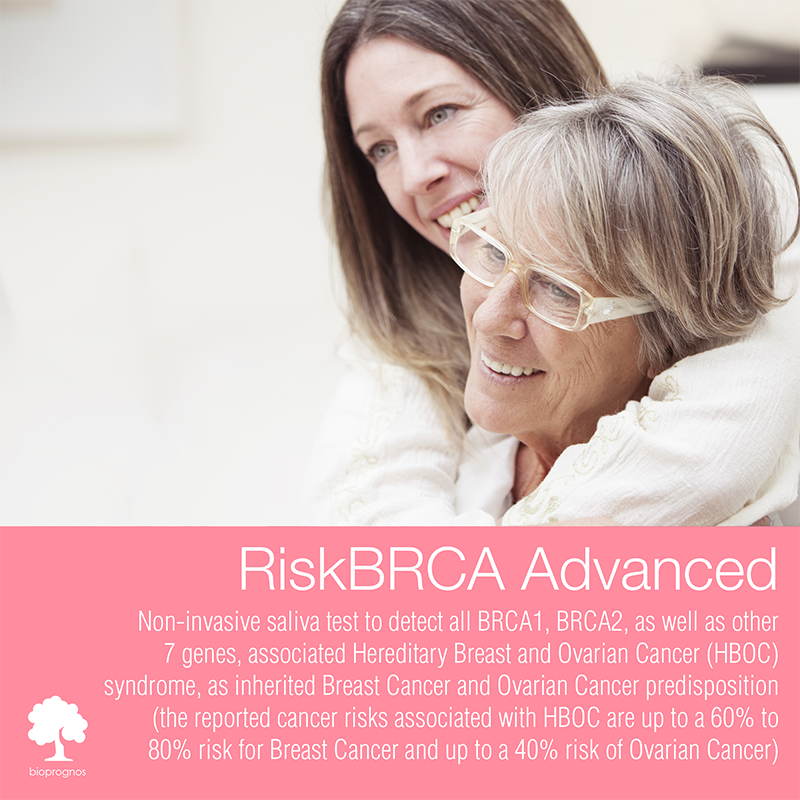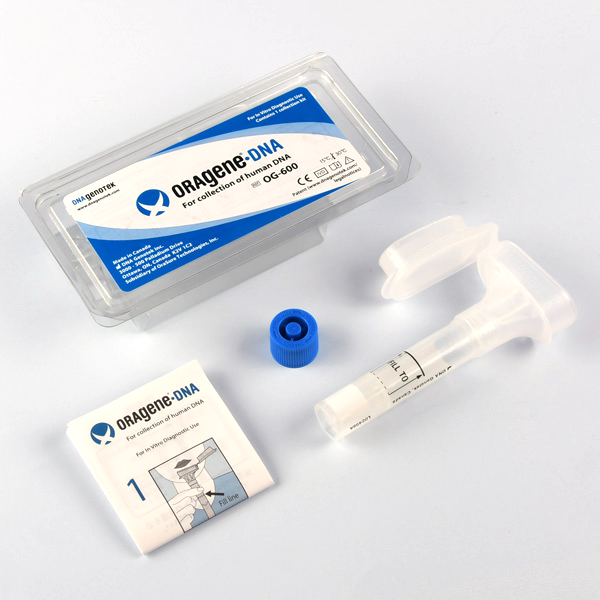RiskBRCA Advanced
Visión general
El test RiskBRCA Advanced es una prueba muy completa para conocer el riesgo hereditario de cáncer de mama y ovario, ya que analiza todas las mutaciones de los genes BRCA1 y BRCA2 BRCA relacionadas con el cáncer hereditario de mama y de ovario, así como otras de 7 genes estrechamente relacionadas también con estos dos tipos de cáncer.

Pulse aquí para descargar el folleto en formato PDF.
Fundamentos del test RiskBRCA Advanced
RiskBRCA Advanced captura y secuencia las regiones genómicas de 9 genes, utilizando técnicas modernas de Next Generation Sequencing (NGS) en combinación con enfoques más clásicos de genética molecular.
En este sentido, con RiskBRCA Advanced es posible detectar mutaciones puntuales en exones, regiones intrónicas profundas (hasta 45bb) y en regiones reguladoras no traducidas de los genes, así como algunas variantes estructurales.
La lista completa de los genes que RiskBRCA Advanced analiza es:
- ATM, BRCA1, BRCA2, CDH1, CHEK2, PALB2, PTEN, STK11 y TP53.
Indicaciones de uso de RiskBRCA Advanced
RiskBRCA Advanced está indicado para detectar mutaciones de los genes BRCA1 y BRCA2, así como otras de 7 genes relacionadas estrechamente con el cáncer de mama y cáncer de ovario hereditario.
Además, a diferencia de otros tests de BIOPROGNOS para ayuda en el diagnóstico (como los tests OncoBREAST Dx, OncoLUNG Dx, OncoOVARIAN Dx, OncoPROSTATE Dx o OncoCUP Dx), RiskBRCA Advanced no necesita prescripción médica.
Cómo hacerse el test RiskBRCA Advanced
Una vez completado el proceso de compra a través de esta página web, recibirá un Saliva Kit para tomar una muestra de su saliva en su domicilio o la dirección indicada.

Una vez que reciba nuestro Saliva Kit, simplemente siga las instrucciones incluidas y devuelva la caja proporcionada con franqueo pagado.
Transcurridos unos 20 días hábiles (según su ubicación), los resultados de su test RiskBRCA Advanced se le enviarán por correo electrónico a la dirección proporcionada durante el proceso de compra.
Referencias
- Howlader N, Noone AM, Krapcho M, et al. (eds). SEER Cancer Statistics Review, 1975-2014, National Cancer Institute. Bethesda, MD, https://seer.cancer.gov/csr/1975_2014/, based on November 2016 SEER data submission, posted to the SEER web site, April 2017.
- Kuchenbaecker KB, Hopper JL, Barnes DR, et al. Risks of breast, ovarian, and contralateral breast cancer for BRCA1 and BRCA2 mutation carriers. JAMA 2017; 317(23):2402-2416.
- Brose MS, Rebbeck TR, Calzone KA, et al. Cancer risk estimates for BRCA1 mutation carriers identified in a risk evaluation program. Journal of the National Cancer Institute 2002; 94(18):1365–1372.
- Finch A, Beiner M, Lubinski J, et al. Salpingo-oophorectomy and the risk of ovarian, fallopian tube, and peritoneal cancers in women with a BRCA1 or BRCA2 mutation. JAMA 2006; 296(2):185–192.
- Levine DA, Argenta PA, Yee CJ, et al. Fallopian tube and primary peritoneal carcinomas associated with BRCA mutations. Journal of Clinical Oncology 2003; 21(22):4222–4227.
- Tai YC, Domchek S, Parmigiani G, Chen S. Breast cancer risk among male BRCA1 and BRCA2 mutation carriers. Journal of the National Cancer Institute 2007; 99(23):1811–1814
- Levy-Lahad E, Friedman E. Cancer risks among BRCA1 and BRCA2 mutation carriers. British Journal of Cancer 2007; 96(1):11–15.
- Ferrone CR, Levine DA, Tang LH, et al. BRCA germline mutations in Jewish patients with pancreatic adenocarcinoma. Journal of Clinical Oncology 2009; 27(3):433–438.
- Cavanagh H, Rogers KM. The role of BRCA1 and BRCA2 mutations in prostate, pancreatic and stomach cancers. Hereditary Cancer in Clinical Practice 2015; 13(1):16.
- Howlett NG, Taniguchi T, Olson S, et al. Biallelic inactivation of BRCA2 in Fanconi anemia. Science 2002; 297(5581):606–609.
- Alter BP. Fanconi anemia and the development of leukemia. Best practice & research. Clinical Haematology 2014; 27(3-4):214-21.
- Sawyer SL, Tian L, Kähkönen M, et al. Biallelic mutations in BRCA1 cause a new Fanconi anemia subtype. Cancer Discovery 2015; 5(2):135-142.
- Hall MJ, Reid JE, Burbidge LA, et al. BRCA1 and BRCA2 mutations in women of different ethnicities undergoing testing for hereditary breast-ovarian cancer. Cancer 2009; 115(10):2222-2233.
- Kurian AW. BRCA1 and BRCA2 mutations across race and ethnicity: distribution and clinical implications. Current Opinion in Obstetrics & Gynecology 2010; 22(1):72-78.
- U.S. Preventive Services Task Force. Risk Assessment, Genetic Counseling, and Genetic Testing for BRCA Related Cancer in Women: Clinical Summary of USPSTF Recommendation. AHRQ Publication No. 12-05164-EF-3. December 2013.
- Peshkin BN, DeMarco TA, Brogan BM, Lerman C, Isaacs C. BRCA1/2 testing: Complex themes in result interpretation. Journal of Clinical Oncology 2001; 19(9):2555–2565.
- Burke W, Daly M, Garber J, et al. Recommendations for follow-up care of individuals with an inherited predisposition to cancer. II. BRCA1 and BRCA2. Cancer Genetics Studies Consortium. JAMA 1997; 277(12):997–1003.
- Sardanelli F, Podo F, Santoro F, et al. Multicenter surveillance of women at high genetic breast cancer risk using mammography, ultrasonography, and contrast-enhanced magnetic resonance imaging (the high breast cancer risk italian 1 study): final results. Investigative Radiology 2011; 46(2):94-105.
- Lord SJ, Lei W, Craft P, et al. A systematic review of the effectiveness of magnetic resonance imaging (MRI) as an addition to mammography and ultrasound in screening young women at high risk of breast cancer. European Journal of Cancer 2007; 43(13):1905-1917.
- Obdeijn IM, Loo CE, Rijnsburger AJ,et al. Assessment of false-negative cases of breast MR imaging in women with a familial or genetic predisposition. Breast Cancer Research and Treatment 2010; 119(2):399–407.
- Evans DG, Gaarenstroom KN, Stirling D, et al. Screening for familial ovarian cancer: Poor survival of BRCA1/2 related cancers. Journal of Medical Genetics 2009; 46(9):593–597.
- Domchek SM, Friebel TM, Singer CF, et al. Association of risk-reducing surgery in BRCA1 or BRCA2 mutation carriers with cancer risk and mortality. JAMA 2010; 304(9):967–975.
- Finch AP, Lubinski J, Møller P, et al. Impact of oophorectomy on cancer incidence and mortality in women with a BRCA1 or BRCA2 mutation. Journal of Clinical Oncology 2014; 32(15):1547-1553.
- King MC, Wieand S, Hale K, et al. Tamoxifen and breast cancer incidence among women with inherited mutations in BRCA1 and BRCA2: National Surgical Adjuvant Breast and Bowel Project (NSABP–P1) Breast Cancer Prevention Trial. JAMA 2001; 286(18):2251–2256.
- Phillips KA, Milne RL, Rookus MA, et al. Tamoxifen and risk of contralateral breast cancer for BRCA1 & BRCA2 mutation carriers. Journal of Cli. Oncology 2013; 31(25):3091-3099.
- Gronwald J, Tung N, Foulkes WD, et al. Tamoxifen and contralateral breast cancer in BRCA1 and BRCA2 carriers: An update. Int. Journal of Cancer 2006; 118(9):2281–2284.
- McLaughlin JR, Risch HA, Lubinski J, et al. Reproductive risk factors for ovarian cancer in carriers of BRCA1 or BRCA2 mutations: A case-control study. Lancet Oncology 2007; 8(1):26–34.
- Metcalfe K, Lynch HT, Ghadirian P. Risk of ipsilateral breast cancer in BRCA1 and BRCA2 mutation carriers. Breast Cancer Research and Treatment 2011; 127(1):287-296.

